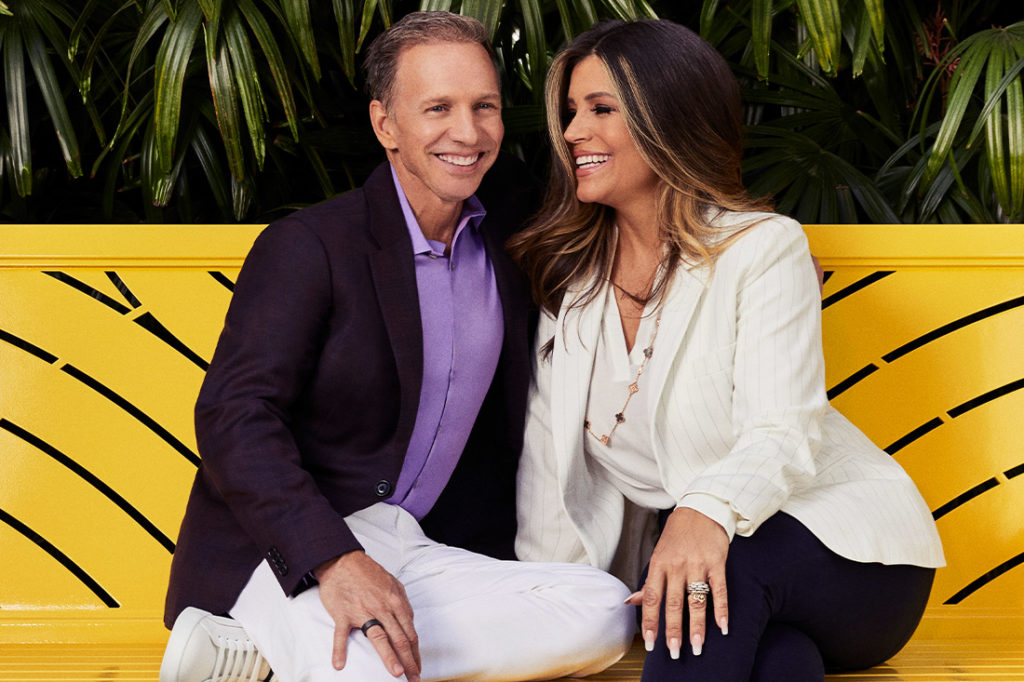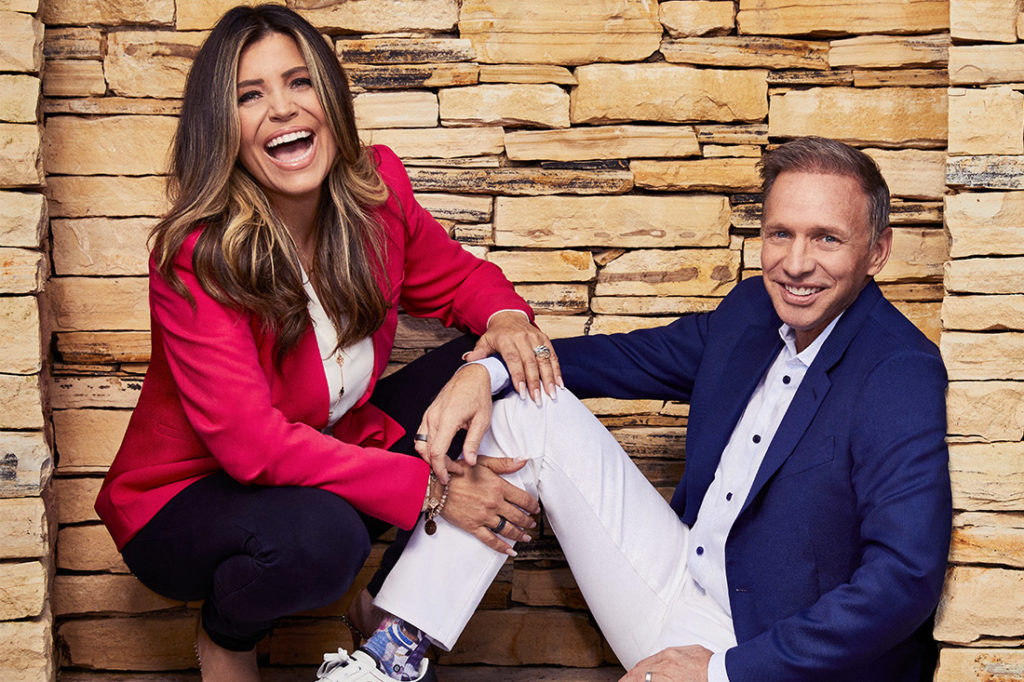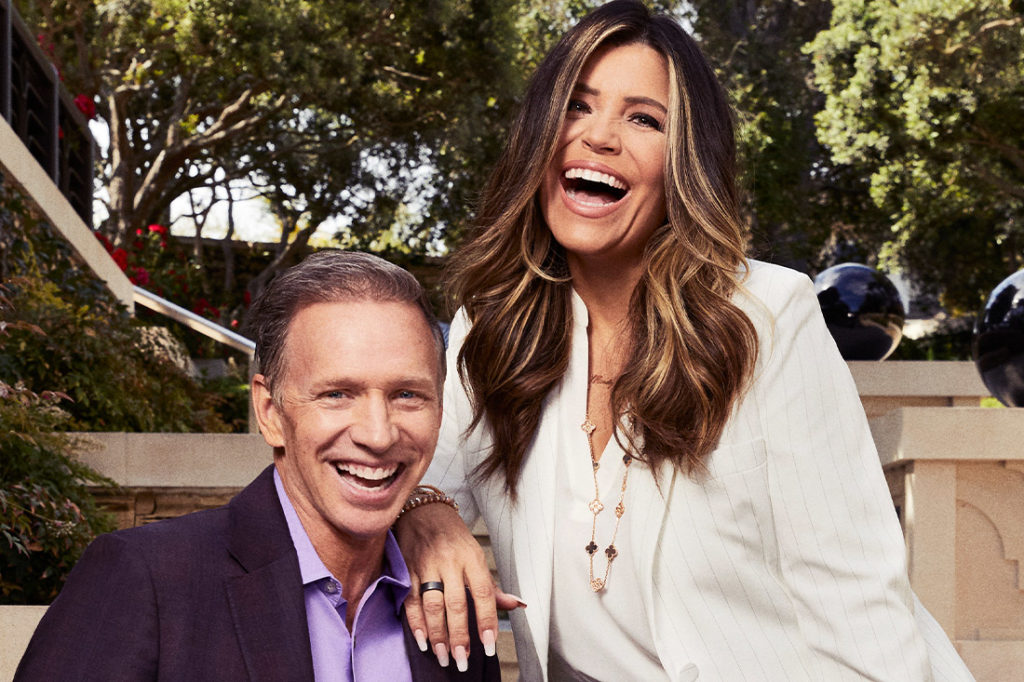They call themselves Glenndy.
In joint interviews and on their own podcast they interrupt each other, finish each other’s thoughts, tease each other, and riff on each other’s comments. It’s entertaining to listen to entrepreneurs Glenn and Mindy Stearns because you never know what’s going to come out of this married couple’s mouths next.
It could be valuable wisdom for entrepreneurs, the type they earned by spending decades in the trenches, most recently as founders of Kind Lending.
It could be hard-earned advice for those struggling with any number of life’s issues, as they’ve endured incredible hardship and become stronger for it.
Or it could be something entirely unexpected, maybe even audacious, as they try to bring sunshine and smiles to a lending industry all too often marked by dourness and rigidity.
Sooner or later, though, they will talk about legacy—in their families, in their businesses, and in how they live their shared life.
We all think about the impact we have on our kids, our families, our friends, our businesses. How can we live in such a way that we leave the world a better place than we found it?
This is a legacy, and everyone wants to leave a good one. Everyone wants their time on this earth to be meaningful, for our lives to matter even after we’re gone. For some, that may simply mean improving their family’s station, creating enough of a nest egg to leave a little to their kids so that they have more advantages than they themselves had. Others might think about their legacy in bigger ways, like creating a company that employs many people and does some good in the world.
Many of us take aggressive steps to forge and enhance our legacies. But few of us bake it into our everyday lives like the Stearns. And fewer still have faced more obstacles than they have to build that legacy. From youthful recklessness to financial crises to cancer diagnoses, they have entered many dark tunnels. But they have always believed there was light at the end of those tunnels, even before they could see it. They’ve always strived to reach that light, and come out better for it.
If there’s one lesson to gain from the combined and intertwined life stories of Glenn and Mindy Stearns and their attempts to leave lasting legacies—both individually and together—it is this: Trouble and hardship are essential building blocks of a dynamic legacy, as long as you overcome them and learn from them.
* * *

They have a uniquely public relationship, she the former TV reporter and actress and he the founder and public face of one of the largest lending companies in the country. They are often interviewed together, and broadly speaking, they are aligned on the big issues of life—the prominence of family, how to run a business, how to treat others, the importance of legacy, etc. Narrowly speaking, they come from very different backgrounds and have different personalities, as well as their own individual projects—he’s the face of a business reality series, she co-hosts a podcast with two pals, Friendsome and Then Some, focusing on the midlife experience.
To understand their shared legacy—what they will leave behind—it is important to understand their origins.
She is goofy and gregarious, vivacious and fun-loving, a former reporter for Entertainment Tonight who first became “famous” by crowing like a rooster on The Oprah Winfrey Show. More than two decades later, she is still sometimes called The Rooster Lady and breaks out that unique skill on occasion. She also does credible impressions of dogs and babies. Her ever-present smile swallows her whole head.
He’s no shrinking violet, but comparatively is far more reserved. His smile creeps across his face slowly, as if it knows the punchline is coming but doesn’t want to give it away. He amassed an enormous fortune in the lending business, a buttoned-down enterprise that takes itself seriously—maybe too seriously, he says.
He spent much of his early career making shrewd deals with little margin for error. “People don’t understand the value of crumbs,” he says. Perhaps he understands the value of crumbs because in his childhood, that’s what his family had. Glenn’s early years in Maryland were troubled. Diagnosed with dyslexia, he failed fourth grade and became a father at 14.
His mother, grandparents, aunt and uncle all died from alcohol complications. “Most of the people I grew up with are either in jail or dead,” he says on a video accompanying his induction into the Horatio Alger Association, which has as members people who have overcome humble or economically challenging childhoods.
Mindy’s childhood was far more stable. Her career path was unconventional, if not unforeseeable. She worked as a hygienist in her dad’s dental practice. Attention from her appearance on Oprah led her to become a morning radio co-host in Saginaw, Michigan, and eventually a TV reporter and actress.
As a young man, Glenn wrestled with alcohol. “I was going to the bar every single night,” he says in an interview with Giselle Fernandez for L.A. Stories. “That’s what my father and mother did. That’s what everyone I knew did. I remember laughing, and as I tilted my head back in a drunken stupor at 1 in the morning, I said, Man, I laughed at the same dumb stuff last night. And the night before.”
Deep in an alcohol-induced haze, he had a moment of clarity. “I thought, I don’t want to do it anymore.”

He instead wanted to rewrite the family legacy, one that threatened to become his own. The next day, he began planning a road trip to California. After he arrived, he found himself gaping at a gorgeous home with an incredible ocean view. In a story he has told often, he asked a man trimming bushes what he did for a living to enable him to acquire such a home. The man said he was the gardener, but that he believed the homeowner worked in real estate.
Glenn worked in the lending business for about 10 months at a company offering loans to homebuyers. Three of his co-workers went out on their own, so at age 25 he did, too, along with a partner. He waited tables for three years as he started the business to make ends meet.
In the beginning, he did not have money or many connections, or, to hear him tell it, much of a clue. “That’s where they say ignorance is bliss,” he said on L.A. Story. “You don’t know what you don’t know. I had no idea what I was doing at all.” In not knowing what he didn’t know, Stearns managed to grow his business by inadvertently under-bidding his competition by massive amounts. This led to some huge government contracts, and eventually Stearns Lending became something of an empire.
He married and had three more kids. That marriage ended in divorce, in part, he says, because his life lacked balance.
At that point—father of four, divorced—his family legacy could have been disastrous. But in a pattern he would repeat in his business life, he repaired that family by being proactive.
He and Mindy met briefly at a blackjack table in 2002, though neither had or showed any interest in the other. It’s ironic that two go-getters who seize opportunities trace their relationship to playing a game of chance at which neither one made the first move.
That indecision didn’t last long. Glenn later saw her on TV, recognized her, and contacted her through the station. From the beginning of their time together, he was focused on not repeating the mistakes of his previous relationships. On their first date, he said his relationships with the two mothers of his children were paramount in his life and would remain so.
That’s not an opening line dating experts would suggest for a man to woo a woman. But it worked. While Glenn’s relationships with those women had once been broken, he had strived to repair them as best as he could. And it wasn’t just lip service. He invited the mother of his first child, Kathy, his ex-wife, Amber, and Mindy to attend the gala at which he was inducted into the Horatio Alger Association, and he thanked them all from the stage.
It wasn’t always easy, but now, years later, Amber and Mindy are friends and they’ve all managed to turn that unlikely family dynamic into something that is both healthy and endures. Glenn and Mindy have two daughters, and Amber is their godmother.
“I really respected that you just put it out there,” Mindy says. “You didn’t try to hide it. He didn’t try to make excuses for it. He was very open and very honest, and I thought, wow that’s really impressive. That’s a character mark for him. And that really drew me.”
Glenn says often that his mistakes have made him who he is, so he sees no reason to hide them. “When it’s going well and we are big and happy and we do good things for people—that’s not what life is about,” he said on Grit Happens, the podcast he and Mindy share. “It’s what happens when life isn’t going as you want …”
“When it punches you in the face,” Mindy interjects.
“Who are you then?” Glenn asks. “When you’re stripped of everything? The time when I was down the most I realized, This is my time to shine. People will remember you more when you’re down. My kids, Mindy, others are looking at me. How will you be? It’s not easy.”
Easy, no. But it is absolutely necessary in order to construct and maintain a worthy legacy. For the two of them, being strong often means facing problems head on and trying to solve them proactively rather than waiting and reacting. By then it might be too late. Glenn in particular seems to thrive off of tough conversations.
The lending crisis of 2007 and 2008 is a perfect example. Seemingly overnight, revenue at Stearns Lending dropped by 80%. “Everywhere I looked, it was dark, dark, dark, and I couldn’t find a way out of it,” he once said.
The way out was to go right through it. He put a piece of paper in a clipboard and wrote down the names of companies and the amounts they said he owed them because they wanted him to buy the loans back. Whether he was contractually obligated to buy them back was a different, and perhaps irrelevant, question because this problem needed to be fixed, and quickly, regardless.
He thought his company was finished. But as he often has throughout his life, he decided to fight. His legacy of perseverance is built on such moments. “He is so fearless when it comes to confrontation,” Mindy says. “He’s never been bound or paralyzed by fear.”
Glenn brushes off the fearless compliment. He doesn’t like difficult conversations any more than anybody else. But he has learned that out of them comes respect and strong relationships. So amid the lending meltdown, he flew to New York, San Francisco and other places, locked himself in a room with officials of those companies and didn’t come out until they settled the deals. None of it was easy. But every single one of them stuck with him.
“You learn from pain. You don’t learn when everything is great,” Mindy says. “The greatest lessons are learned in pain.”
One day Glenn got a call from a man named Bruce at a credit company; he said the company was canceling its deals with all but a small handful of lenders, and Glenn’s company was not among them. If that happened, his business would have gone under. Glenn called Bruce back the next day. The conversation went something like this:
Glenn: I want to talk about that “small handful” in person.
Bruce: You’re in California. I’m in New York. That’s not going to happen.
Glenn: Well, actually, I flew all night and I’m in your lobby. Can I come up and see you now?
The man allowed Glenn to come up, and soon Stearns Lending was among that small handful. “That showed a deep level of scrappiness,” Mindy says.
Through those proactive steps, he saved the company, and during the housing crisis, it grew to be one of the largest lending organizations in the country. When he turned 50, he sold his majority stake, had a big birthday party and imagined spending time enjoying the fortune he had amassed.
That didn’t happen. At a dinner with Vice President Dick Cheney, the conversation turned to health. Cheney talked about how great he felt. But Glenn felt lousy and had for some time. Cheney gave him the name of his doctor; Glenn was diagnosed with throat cancer shortly thereafter. When the doctor told him he had squamous cell carcinoma, his vision narrowed to the size of a downspout. When the doctor told him the survival rate was around 50%, his vision narrowed to the size of a straw.
His life would come down to the flip of a coin. He didn’t like those odds. His first thought was of his two young daughters and what would happen to them.
Just as he pulled himself off of the mat during the financial crisis, he did so again. He came to see cancer as another chance to prove himself as a fighter. “This will be the best competitor I’ve ever faced,” he says in a YouTube video about his diagnosis. “Let’s take it on. It took me back to my younger days as a scrappy young kid who wanted to duke it out.”
The family moved to Texas so he could undergo treatment there. “That might have been the hardest chapter,” Mindy says. “You handled that just like you handled every business challenge. You went straight into it. You didn’t shy from it. You threw all your energy, resources, whatever you could.”
“There were many times I’m crying the blues, feeling sorry for myself, having the pressure of everything coming on,” he says on Grit Happens. “But when I get my wits about me, that’s the right time to be strong.”
The legacy of Glenn’s cancer spins forward in how the couple now approaches life.
A few years ago, Glenn had the opportunity to intentionally create pressure for himself. He was asked to star in a Discovery Channel reality show called Undercover Billionaire. The hook would be that he started out with only $100, a cellphone and a pickup truck in Erie, Pennsylvania—a town he knew nothing about. He was given 90 days to create a company worth $1 million and totally outside his expertise. He couldn’t use his name, contacts or fortune.
Production of the show was delayed when the cancer returned but started after he finished treatment. (He’s in remission now.) By the end of the first season, he had founded a restaurant called Underdog BBQ. During the pandemic he continued his work to revitalize Erie as part of a spinoff series for Discovery Plus entitled Undercover Billionaire: Comeback City, which premiered this spring.
Always looking for a new challenge, Glenn and Mindy found one in creating Kind Lending in 2020. Time away from the lending business gave Glenn perspective on what works, what doesn’t, and how best to build a company.
They decided to be countercultural. In a business era in which shareholder value trumps all else, and in which profit and loss—P&L—are the determining factor in almost every decision, they opted to create a company in which culture, not profits, was the defining characteristic.
The first word on the list of attributes the company is looking for in its employees: fun. Mindy’s original title at Kind Lending was Chief Happiness Officer, which eventually changed to Chief Kindness Officer.
“It’s very, very simple,” Glenn says. “We don’t take ourselves too seriously. We laugh, we have fun.”
They hope, they say, to foster a culture where people want to work. If employees spend eight hours a day there, there should be abundant fun and no drudgery. “If we can move people, if we can get people to realize that what they do is so important and special, then it’s going to change their lives,” Glenn says. “And when you do that, you attract the best people, and when you do that, you win.”
Says Mindy: “We focus on the P&L, but it’s people and love.”
The company issued its first loan in July 2020. Neither Glenn nor Mindy has taken a paycheck. This isn’t about money to them. But don’t get too caught up in the happiness and culture talk to misconstrue that as they don’t care about being successful. Glenn is far too competitive for that. And while he refuses to define success by traditional numbers, he still knows those numbers and can recite them. They simply aren’t Kind’s reason for existence. The Stearns want to prove it is possible to win with kindness and have fun doing it.
Even seemingly minor details about how the company operates have hints of legacy marbled in. For example, if someone leaves the company, their commissions, pipelines and loans go with them. Employees can then use those to continue their own legacies. Common practice is that the company keeps them. “It is not OK in my mind,” Glenn says. “That means we use you. We don’t use people at Kind Lending.”
Adds Mindy: “We work with people. They don’t work for us. They work with us.”
“That’s more important to me than the money aspect,” Glenn says. “That’s got to be there. That’s important, but it’s not as important as your self-satisfaction and the feeling that you’ve really done something to help. It’s bigger than just a job.”
It’s a legacy, Glenn says: “When I do put my head down for the last time and take a breath, I want to smile thinking, man, I made a difference.”
This article originally appeared in the September/October 2021 issue of SUCCESS magazine.
Photos by Chris Patey










